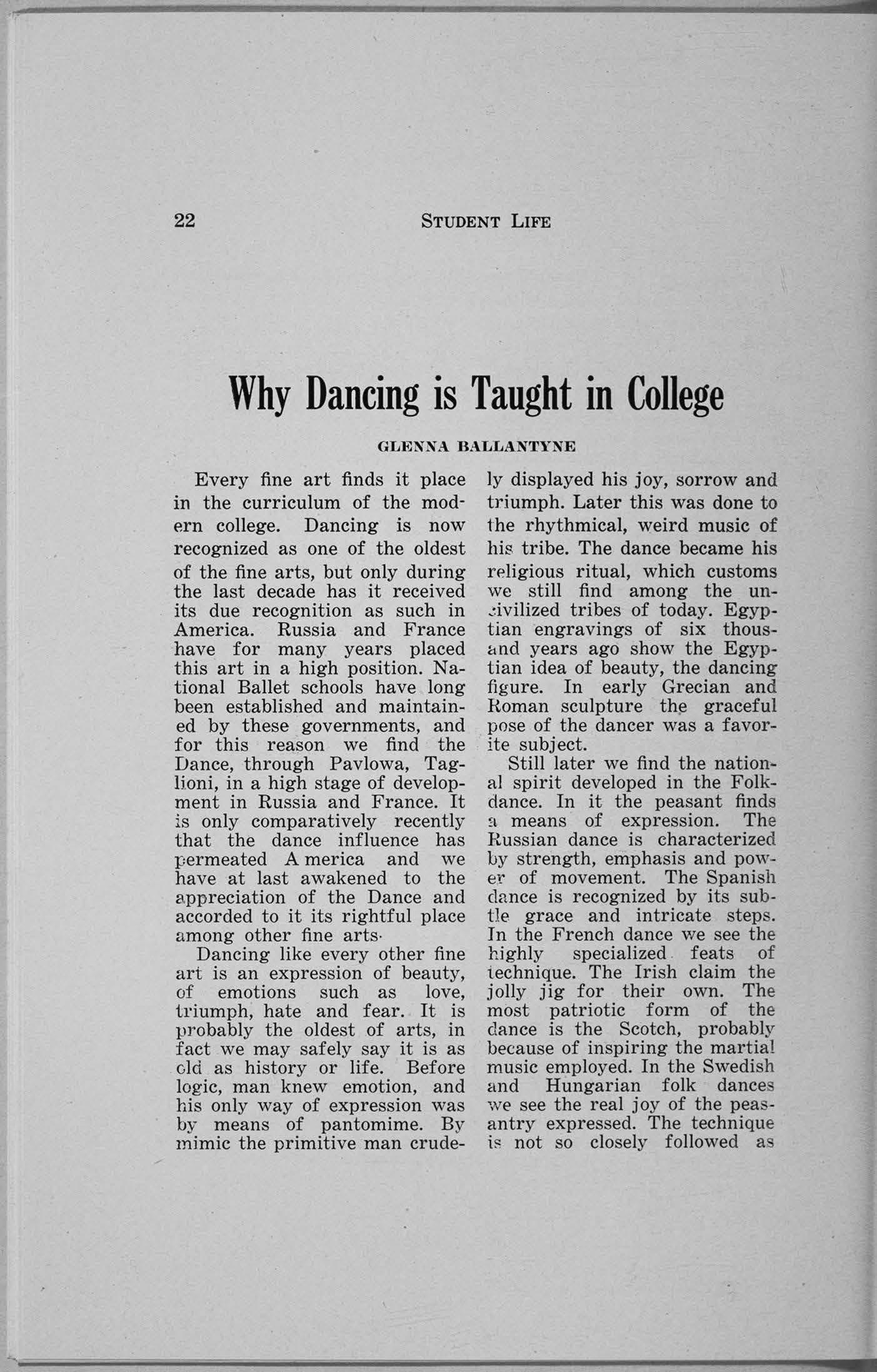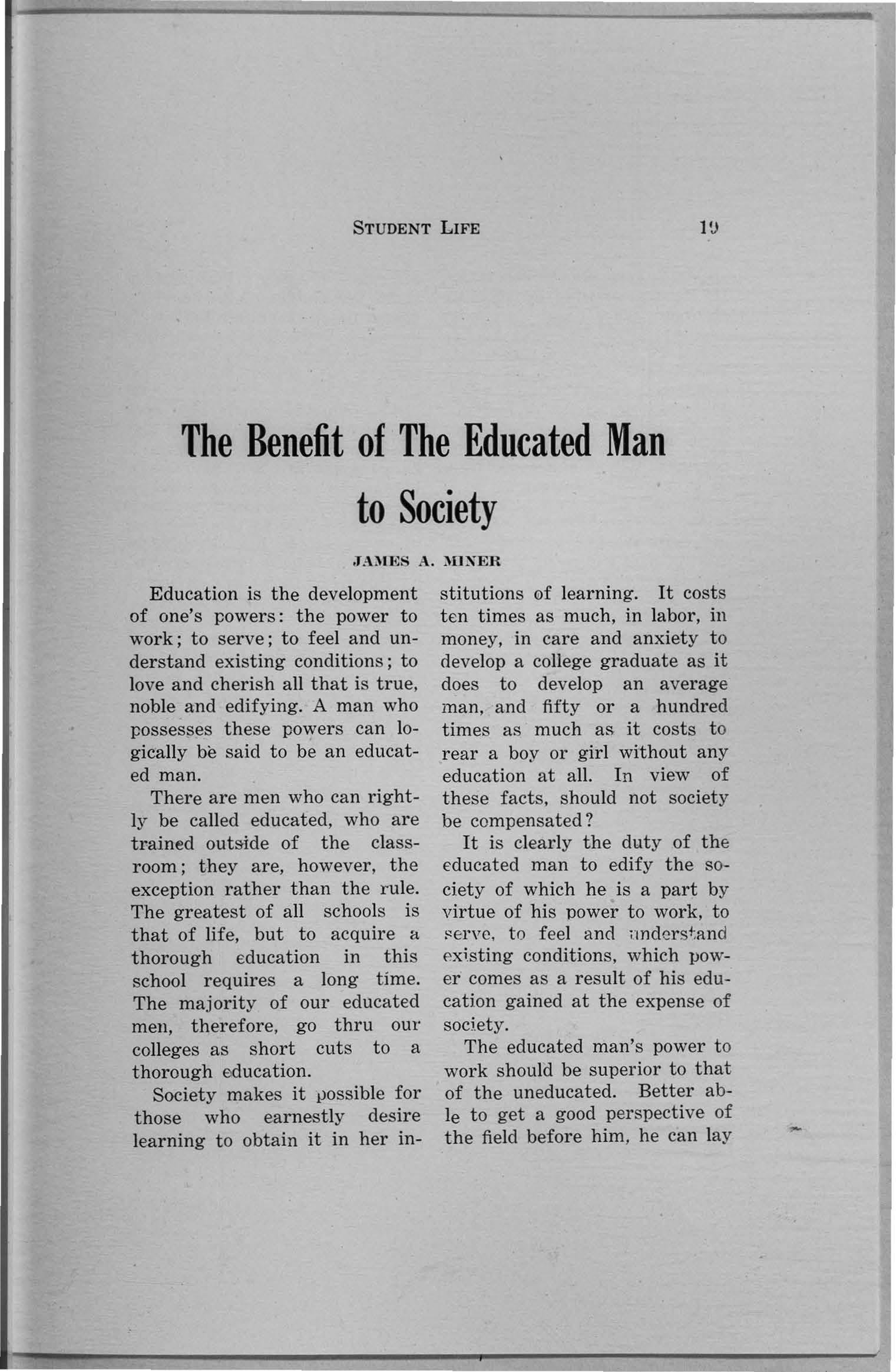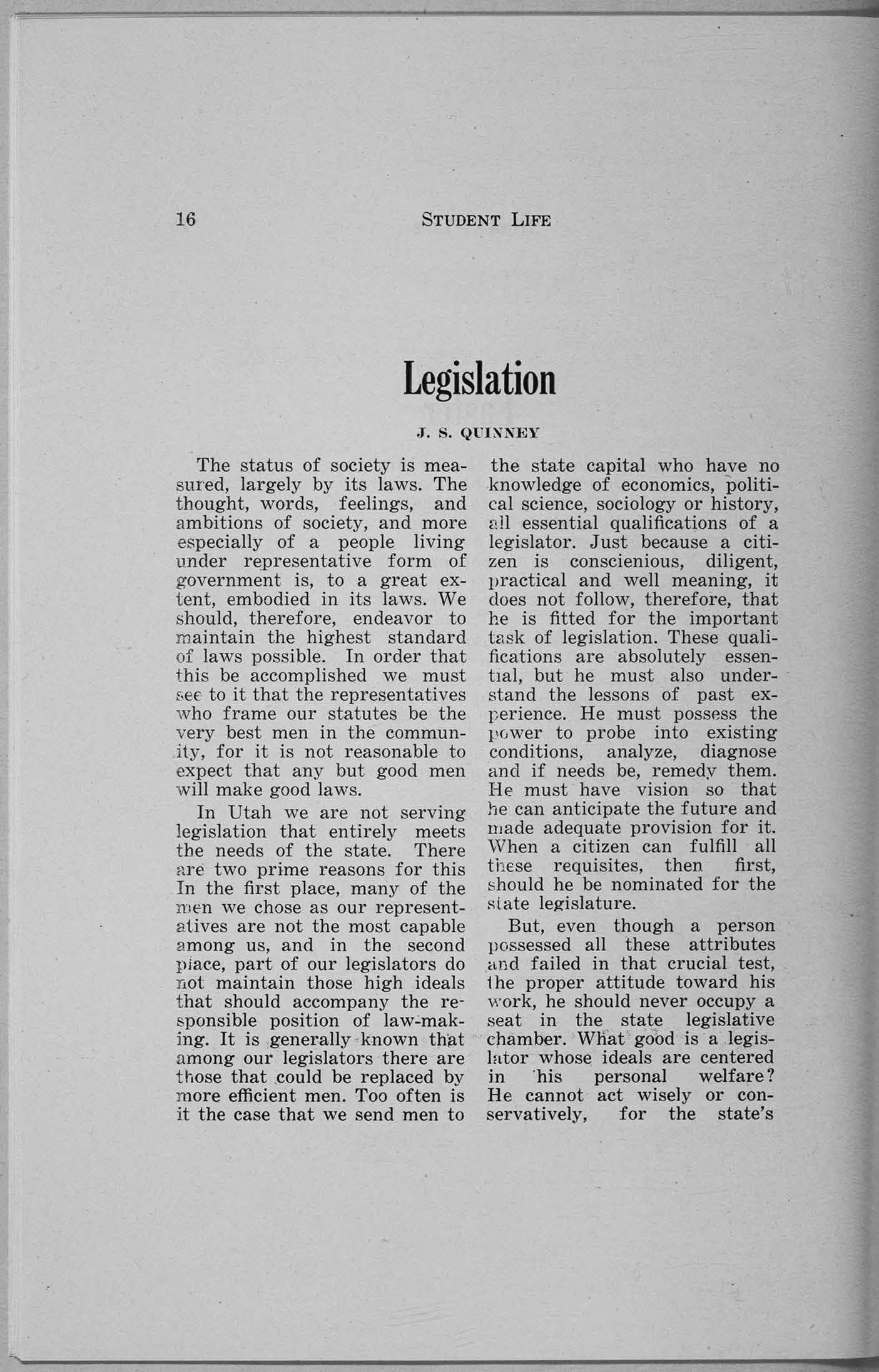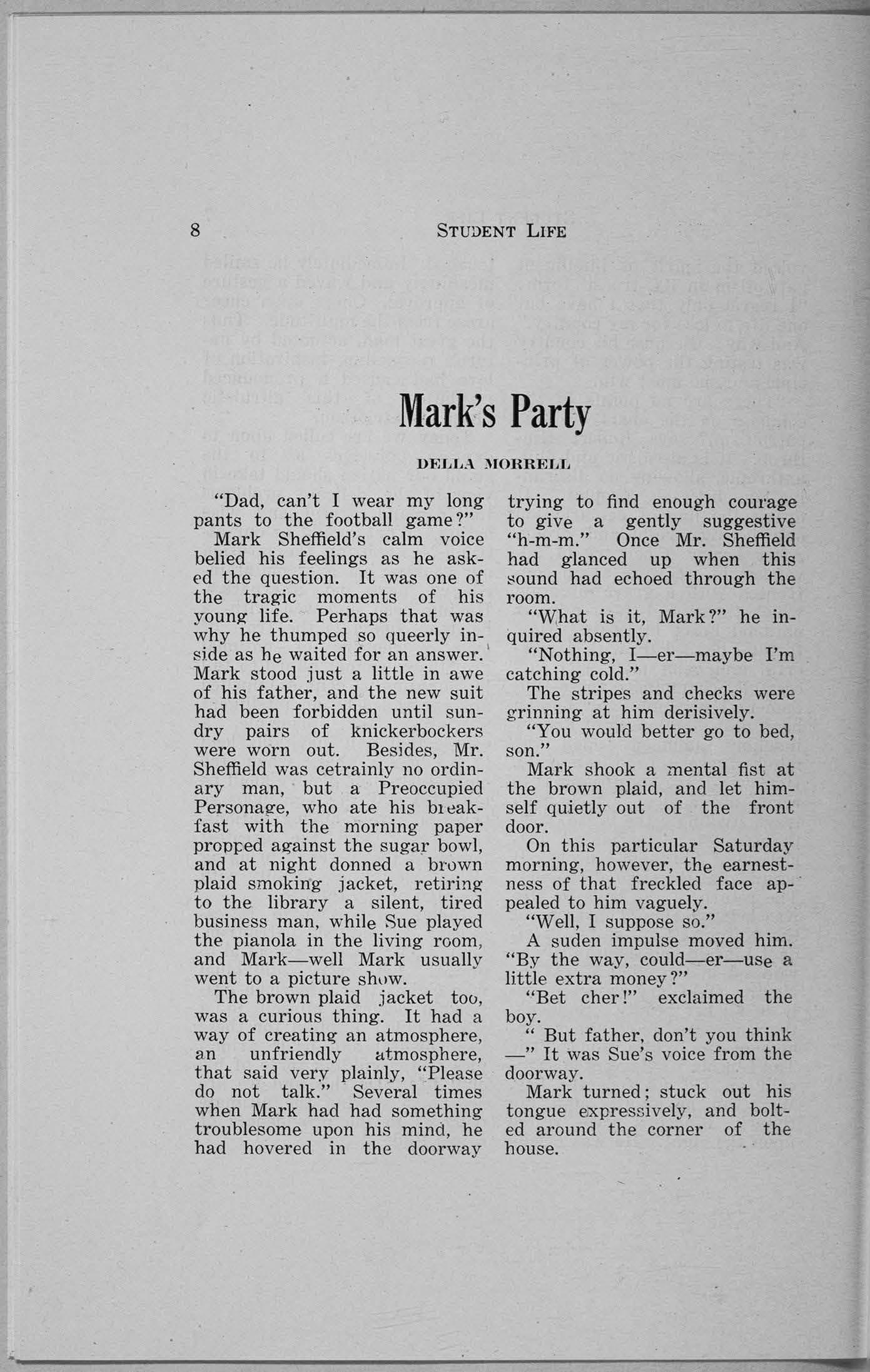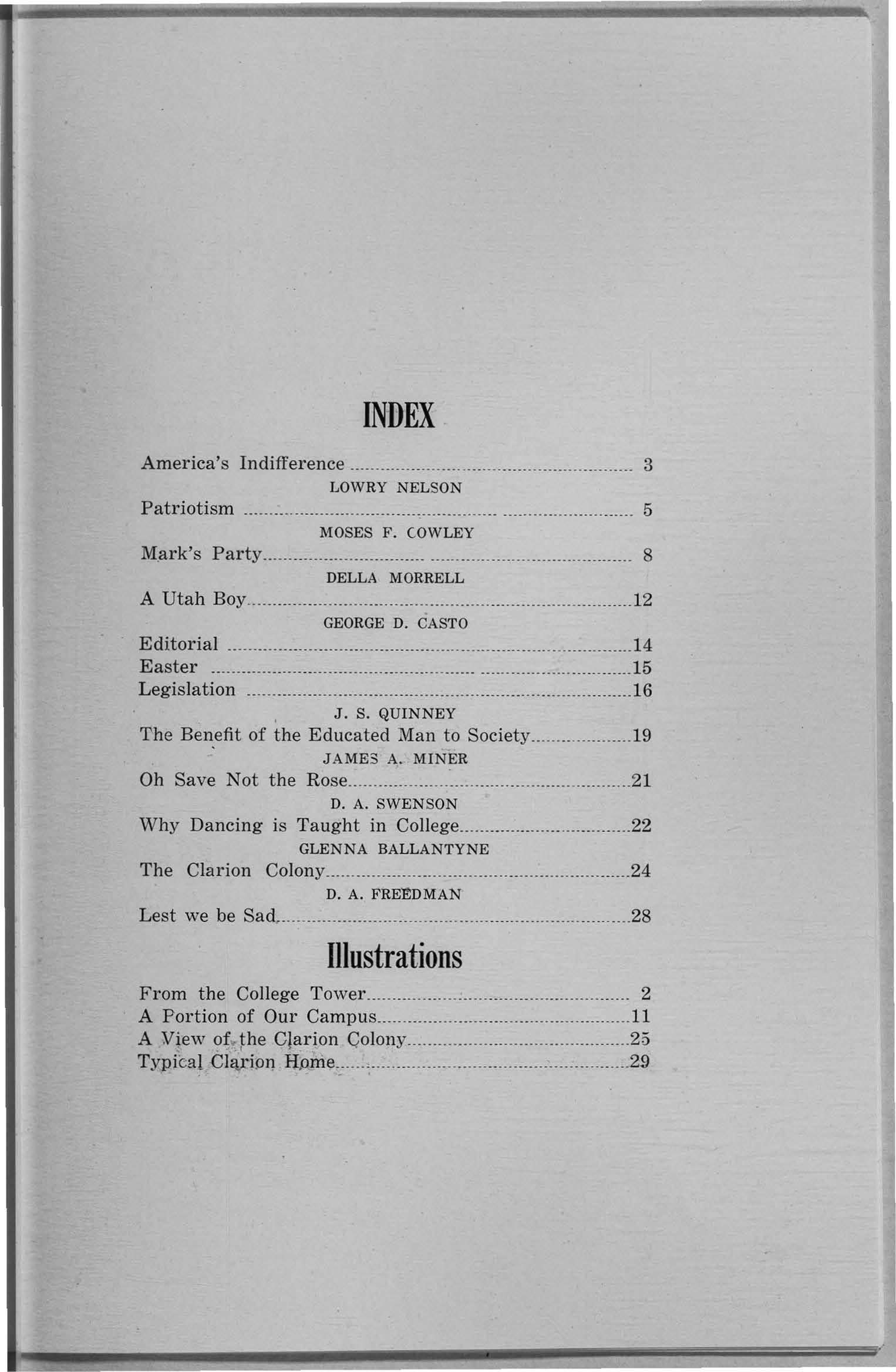
7 minute read
Patriotism
STUDENT LIFE
5
-P~tri0tism--Insttuc
_t1v;,f ~and Intelligent
,. WINNING ADDRESS FOR MEDAL GIVEN BY SONS OF AMERICAN UEVOLUTION
MOSES F. COWLEY
Patriotism may be defined as a Jove for one's country that gives an unre served and zealous support to her institutions and interests. In relation to the history of the development of civilization as characterized by wars and str uggles this word has a most profound signifi- cance. All forms of patriotism may be classed as two kinds : instinctive and intelligent. Both contain one fundamental element (in common) which is self-sacrifice with an unqualified devotion to the cause of the many; but other characteristics make a marked distinction bet ween them.
Instinctive patriotism is that patriotism impelled by the emo- tions of man, regardless of his judgment. These emotions may be love, fear, hatred, ambition or a desire for aggrandizement, each or all of which may appear on the surface in the form "·of Jove and loyalty for one's coun- try. It comes by pure instinct alone; hence the object of this kind of patriotism may be right or wrong, as it sees only the cause of the party possessed by it. One zealous patriot has ex- pressed it in these words, "Our Country! In her intercourse
with foreign nations may she always be in the right, but our country, right or wrong."
As one of the underlying causes of the gigantic war now waging in Europe I suggest this misdirected patriotism. In the seventeenth century. Louis IV of France vigorously prosecuted a policy of establishing a great- er and more glorious country, disregarding the rights of his neighbors. This policy reached its climax in the career of Napoleon Bonaparte. He · declared "What the French want is glory and the satisfaction of their van ity."
Was this kind of patriotism lacking, to uphold him in his burning ambition? Let the hundreds of thousands of dead who passionately gave their lives for his cause answer this question in awfu l silence.
G;ermany has Jived by the same national idea which obtained a powerful inception un- der Frederick the Great in the eighteenth century. Expres- sive of our treatment of this phase of the subjec t, he proclaimed after one of his victories, "Happy are they who having secured their own advantage can look tranquilly upon
6
STUDENT LIFE
thE: embarrassment of others." l<ismark was a product of this ~ind of patriotism, while William II, the present Kaiser of Germany, is the embodiment of all that thi s conception suggests.
The histo ry of England , Ru s- sia and Austria is similar, each nation being imbued, more or less, with the idea that God is shaping her political and com- mercial destiny, that each one mu st live and triumph, incurring, if need be, the death of her national neighb ors . What a reflection upon an all-wise, allmerciful and ju st Diety ! Thu fi the pre sent theatre of war pre- sents to our view the result of the workings of this kind 01' patrioti sm. It s contemp lation horrifi es and awes our senses with inten se solemnity. What the end of the world would be should thi s kind of patriotism be the impelling force one dare not think . Rather let us devote our thoughts to that patriotism 1 have termed intelligent. Thi s kind repre sent s the world in its trne st sense, involving also man 's emotions but guarded and <lirected by a keen intelle ct and cont rolled by his underlying better self. It mean s unqualified and true devotion to one's country, only when his country is incessa ntl y struggling for the triumph of principle. Indeed it recognize s and sup port s only the fundamental and basic princip les that allow equally to all mankind, the right to life , libe1·ty and the pursuit of happi- ness. Thi s is the only patriot - ism that shall invariably endure

to reach a praiseworthy goal in the course of human events.
America represents this patrioti sm, the first great victory of which was the Revolutionary war. That war was a trying battle for principles. These principle s for freedom and righteousne ss may be summed up in the word virtue, for which the father of our country unre- Btrictedly dedicated to his life . Hear the word s of Phillip Fre- neau:
'"Oh, Washington, thrice glori-
ous name,
What due rewards can man decree Enipires drn fa1· beneath thy
aim,
And sceptres have no cha1·ms for thee; l'irtue alone has your regard, And she nmst be yom· great re- ward."
The spirit of the Revolutionary war was not a passionate and an unwise antagonism against the mother country, but rather the sacrifice of everything to realize the enjoyment of those principles that are deep-rooted in the soul of true character. I desire to mention a person, who to the casual thinkGr performed a shamefu l mis- ~ion and died an inglorious death, but to him who interpret scorrectl y the motives that actuate brave and honest hearts, he represents grand ly the spirit of that age. In his last words, 11 ttered amid st circumstances that would tax the strongest soul to the core, Na than Hale
STUDENT LIFE
voiced the spirit of intelligent patriotism in its truest form: "I regret only that I have but one life to lose for my country." And why? Because his country was testing the power of principle and she must win. "There are no points of the compass on the chart of true patriotism," says Robert Kinthrop. It is altruistic and philanthropic, allowing no discrimination between peoples. It draws the line of demarkation c,nly between right and wrong. After nearly a century of ad- vancement we were again con- fronted with a grave situation which threatened to rend our national heart in twain. How fortune blessed us with a powerful and calm man who suc- cessfully championed these fun - damen'taL principl~ ~ o:f huma:p happine ss is an epo~h of history indelibly stamped upon the mind of eve·ry American child. However, it may not be amiss to relate an incident which portrays strikingly the broad, com- prehensive and untainted patriotism of Abraham Lincoln . It occurred at the close of the war. The return of the boys in blue was being reviewed in front of the National Capitol by Pre sident Lincoln and thousands who rejoiced in the victory of the North. Old Glory waved proudly in all her beauty. Suddenly there appeared in an upper window of the White House little Tad Lincoln wavini;- enthusiasti - cally an old Confederate flag. What an apparently unfitting thing! Lincoln 's gaze reste d upon the sight. He was deepl_v

touched. Immediately he smiled meaningly and waved a gestu n, of approval. Cheel' upon cheer arose from the multitude. Thu s the great man, actuated by na- ture's reconciling inspiration of love had caused a pronounce rl revelation of this altruisti c phase of patriotism.
Today we are called upon to express ourselves as to the sta nd our nation should take in view of the delicate problems that demand careful and wise action. What should be our attitude? Realizing the positio n our country has ever maintained, we have no alternative . Having been endowed with a heritage which is the fruit of over a century of nationa l growth we cannot afford to fail in pursuing a course impelle d and controlled by an intelligen t p,atrioti sm for principle, a ~ourse that will inevitably lead to a destiny that, when the eternal scroll of history shall be unfolded, will distingui sh us as being a nation among nation s, the leader and the greate st power of the world in bringing all nation s into conformity with the plan of the Infinite.
Individu al patriotism is es- sentia l to united patriotism. l_;nited patriotism is essential to power. Let every individual who claims true American citizenship dedicate himself to a whole-souled devotion for these fundamental and basic princ iples as the guiding force of his civil life. Do this and we are secure in leaving the ultima te cntcome to the providences of a just God.

